Text
Intellectual Playfulness
I wrote this blog for a university course I did, a “Student-Lead Individually Created Course” (SLICC) and now I’ve finished that course I wanted to share it here.
This is a skill that I feel can be lost in the traditional education system. In the study of mathematics, when you first learn at school how to work out your times tables, it is understandable that it is not seen as a particularly…
View On WordPress
10 notes
·
View notes
Text
Hi hi! As so many people are getting their results and thinking about University, I wanted to draw attention to this post I wrote a few months ago to give advice about 1st year physics at uni!
How to Survive the First Year of a Physics degree
~A summary of first year~ What to do and what not to do
It’s about that time of year when the year 13s and gap yah students are starting to think about the new chapter of their life that will (pandemic allowing) commence in Autumn. First year. I’ve just submitted my last piece of coursework for the year, in my Mathematical Physics degree at the University of Edinburgh, and I feel I’ve learnt so much this year. Not just calculus and quantum mechanics, but I mean life stuff. As well as a lot of physics and maths, that is.
Tip 1 - don’t do all the work.
Yes, I know your lecturers have told you the importance of working. I know your lecturers have told you to do all the exercises in the textbook as reading before the lectures. Yes I know it seems like everyone else has done all the exercises. But no, you don’t need to. I started off first semester on a course called Introduction to Linear Algebra, and in each of our reading guides were a list of exercises to do in the textbook - usually “do all the odd numbers exercises from chapters 1-2, plus question 34 and 40″ and I’d stay up until like 3am every day working through them as there were about 50-60 exercises per chapter, and a few chapters per week, and I was like ‘oh my god. How is everyone getting everything done, how is everyone doing all of this?’ and when I got texts from people like ‘hey becky have you done question 17 yet’ ‘have you read chapter 2′ but no no no and no. Yes, someone else *may* have done question 17, it doesn’t mean you have to. Pick the most important exercises to do, pick the ones you don’t understand really how to do, spend time learning the techniques behind problem solving and don’t just do questions for the sake of doing questions. I ended up just being like *nope* and just picking, sometimes only about 5 questions (rather than 120…) and doing them properly, and I got 94% on that course so - you don’t *need* to do it all to do well.
The key thing I learnt in semester 1 was - you have as much work to do as you want to do. If you finish all your work, you’ll find more to do, so the thing you have to learn is what the right amount of work is *for you* not for your friend, not for your course mates, not for that person who keeps asking you the answers to the hand ins x y and z, for you.
Tip 2 - don’t take extra courses unless you have to
I inflicted extra course credits on myself, meaning I was taking 1/3 more courses than most (I think all…) people in my year. My advice - don’t. It may make you, or even other people think you’re ‘academically driven’ or something, but in reality, it means your spreading yourself too thin and you don’t have the time to invest in other stuff, like reading around the bits you find interesting. Just because you *can* take extra courses don’t mean you *should*.
Tip 3 - ask questions
I have become *known* in my yeargroup, in the School of Physics, by my lecturers and TAs and tutors, for being literally the first person to ask questions. I’ve had drunk classmates come up to me on pub crawls saying “omg Becky thanks for asking those questions in lectures, I was too scared to ask but I didn’t understand that either,” - trust me, you’re not the only one who doesn’t understand something. The general rule of thumb is, in the lectures, if your lecturer is up for answering questions (some lecturers on content heavy course are very pushed for time so prefer questions at the end), then stick to those questions about the content of the course - eg. clarifying something on the slides, asking for them to explain a concept you don’t get. If you want to know something *extra* that isn’t on the syllabus but you’re curious about knowing, go up to them at the end for that, or drop them an email, or if it’s too long to put in an email, ask to see them in their office.
Trust me when I say, once you’ve established a relationship with the people who teach you, it’s much easier to ask them stuff. Once you get to know who’s good at answering questions, and who isn’t so good at answering questions, and you have a lil circle of people you can go ask stuff, it becomes a lot easier.
On a side note, sometimes the best people to ask your questions to are you TAs/tutors. They’re usually PhD students and so they’ve done this stuff a lot more recently, and remember more recently being a student, so they can be a good person to ask and often have more time and are more chill than lecturers and easier to approach if you’re intimidated by Chair-Royal-Professor-Sir-MBE because you don’t want to look ‘stupid’, then try asking the TAs.
This has become quite a long post… so I’ll stop here for now, but I will have more general adjusting to uni posts coming up throughout the summer, so stay tuned.
My DMs & Asks are always open if you have any questions about studying physics or studying at Edinburgh or studying Physics at Edinburgh ;)
Becky :)
#physicsblr#freshers 2020#edinburgh freshers#physics degree#how to survive a physics degree#scienceblr#physics student#maths student#mathsblr#freshers#starting uni#starting university#uni life
118 notes
·
View notes
Text
Wavefunction simulations!!
Hello everyone! A good friend of mine has spent *months* creating some wavefunction simulations (as wavefunctions are quite difficult to visualise, the idea of these is to help people understand quantum mechanics better) in javascript. They’re here: https://rawcdn.githack.com/sa08MilneB57/interactive-wavefunctions/197288a213b92e8177b66351e01e346569d41e64/index.html
If you want to play with them (please please do!) then she needs some feedback for her uni project so she can get the good grades she deserves for this, it’d be really nice for some of you guys to fill in! The survey is here: https://survey.sogosurvey.com/r/pIkHVD
And for the nerds amongst you, the link to the github repository is here too! https://github.com/sa08MilneB57/interactive-wavefunctions
#physics#simulations#programming#python#javascript#wavefunctions#physicsblr#mathsblr#maths#uni#phd#research#university#freshers 2020#edinburgh
43 notes
·
View notes
Text
Work-life balance?

We always hear the term ‘work-life balance’, and it often seems like if you have a work > life balance then you’re dedicated and looked up to as an inspiration for being so dedicated to your work. I’ve had people ask me “How do you stay so motivated?” “How do you make yourself do work even when you don’t want to?” “Do you procrastinate?”. And the answer ‘wow I guess I just love my work so much’…
View On WordPress
0 notes
Text
Hey guys! Quick wee note to say that I’m now on Instagram! If you like, you can follow me: I’m @howtosurviveaphysicsdegree (ie. the same as on here). I’ll follow back studygrams, I’m looking to build up a cute feed :-)
#studyblr#studygram#physics student#productivity#productive summer#instagram#physicsblr#mathsblr#maths student
4 notes
·
View notes
Text
Hi followers - important notice!
Given the growth of this blog, I’ve decided to move to a proper independent domain for an academic personal website where I’ll continue my blog but also put stuff like my publications and pre-prints and etc. The website is now live! it’s accessible at www.howtosurviveaphysicsdegree.com and there’s a link on the blog page to subscribe by email to my posts :-) This is just a trial run to start with - I’ll still be putting posts OR links to my posts on here, I want to see what increases my readership stats and if the site doesn’t pick up I’ll probably stick to here more. But please do take a look! It’s more sophisticated than just a tumblr and I really want to develop and expand this platform.
Please please do give me feedback or info on any broken links / things that could be improved, etc. and I’ll defo take them into account! You can always DM me on here or drop me an email using the contact form on my new site :-)
I’m mainly doing this for my career and sharing a tumblr account I probs wouldn’t do with my professors or something hahaha but now I can make it more sleek and professional and it offers me more flexibility!
Lots of love <3
Becky
11 notes
·
View notes
Text
Equality, diversity and inclusion in Physics
Equality and diversity are very important to me. But more often than not people who think they stand for equality don’t, because they feel like promoting more diversity in physics will somehow lower the prestige and make what it means to be part of the physics community less reputed. This is what inequality looks like. Because whether you are male, female or non-binary, whether you are Black or white, whether you are neurodivergent or not, these factors do not influence whether you are good or bad at physics, mathematics, or any area of science. People feel, mainly straight white men if I’m honest, that outreach and encouraging people to get involved in science, is not worthwhile because “the people who want to be scientists will end up being scientists” and that they shouldn’t need encouragement to get there, because dedication and overcoming barriers is ‘character building’.
But, with respect, I disagree entirely. A white man can grow up watching TV where all the scientists on there look like him. Where he can go to school and just say the words “I want to study science” and he will not face prejudice, he will be able to get the normal qualifications, not experience prejudice, and overall the route is relatively easy, particularly if they went to a private school. The statistics of those at Oxford and Cambridge, no matter what they say, still have a disproportionate number of people from the public schools such as Eton, Harrow, etc.
Women get a different outlook. I was privileged enough to attend an all girls school. This meant I didn’t feel overshadowed by my male peers at school, and I was just able to be myself, and I do certainly think I was somewhat blinded by this and I didn’t really acknowledge the amount of stereotypes and injustices that exist. But this only emphasised that they did exist by the time I went to University. At University I was suddenly in male dominated classes. Surrounded by people of so many different backgrounds in the overall university environment, yet in Physics it still was predominantly white men from public school. And honestly, I don’t blame the university for this at all, I do believe it is a problem in society as to what girls subconsciously see as welcoming or unwelcoming environments, and physics I believe is seen as unwelcoming to women.
The point of ED&I isn’t to put unqualified minorities into science which could dampen their prestige, ED&I is about trying to change the fact that minorities often have to work 3x harder to get the same or less credit than they would get if they were straight, white and male.
The bias of some men that they think, not even consciously most the time, that they can just speak over you because your idea isn’t as good as theirs, even when it turns out you are right.
The fact that certain members of faculty will refer to male students of your age as ‘bright young men’ and yet I am still referred to as a ‘wee girl’. This is a direct quote from one male member of staff. This choice of language is demeaning and makes women feel excluded and inferior.
For gender non-conforming, non-binary and transgender folks, the language used by some senior (male) members of staff belittling them, stating things along the lines of “all these boys dressing up as girls just to make an impression. Do they know how stupid it makes them look?”, again, a direct quote of a male staff member speaking to another (female) staff member who, I might add, looked extremely uncomfortable. This isn’t ok behaviour and honestly, it won’t change unless you call it out. Be active. Stand up for yourself and those who don’t have a voice or who are too scared to speak out. In addition, people being able to just openly say how ‘silly’ they think pronoun badges are, or how they think it ‘unnecessary’ for people to state their pronouns in email signatures. Does it affect your quality of life? Does it hurt anyone? Are you well-educated/an expert on this matter? No? Then don’t comment. No one is forcing you to do it but at least don’t belittle the people who aren’t being dicks. To be honest, I never wore pronoun badges or put my pronoun in my email signature before hearing this comment. But after hearing that comment I did both of those things. Even if you’re not trans, be an ally. Don’t make a marginalised community feel even more alienated. Make it normal.
The necessity that so many postdoctoral roles so often require you to spend a few years in the States and that this is not viable for many women with children who can’t just travel from country to country with a toddler or an older child who has friends at school and doesn’t want to move. This is an equality issue. Having a child doesn’t affect your worth as a researcher. It doesn’t make you any lesser, but it does make it harder for you to get a job that suits your lifestyle. That is inequality. By stopping a mother from getting a job she is well qualified for you could be preventing a scientific advance that that person could make in the future. Instead they choose to leave the field because they need security.
The latest news that the new honorary fellows announced by the IOP - there are more honorary fellows named Brian than there are female fellows. Does that scream equality and diversity to you?
Recently I was harassed on social media by straight white male, senior academics. None of whom I’d met before. Being called so many different things; being called Leftist and it being meant as an insult. Being called naive. Literally being called “one of the crazies”. But I will take this abuse and harassment even if it leaves me in tears in the small hours of the night, if it gets the message across and proves that free speech doesn’t mean speech free from consequences. Because it doesn’t and if someone is a racist or discriminating against minorities even if I can’t get them fired because my voice means so little I will move heaven and earth to make sure everyone knows their true character. Because they are wrong and this is a battle that they must lose and the day we give up standing up for ourselves is the day they win.
#physics#physicsblr#equality and diversity#edi#women in stem#women in physics#black in the ivory#feminism#institute of physics#studyblr#productivity#phd life#academia#systematic racism
24 notes
·
View notes
Text
The Electron-Positron Collider
On the topic of a new electron-positron collider in response to people saying they should spend money on something 'more important'! (I am open to differing opinions from my own - this is my own view and the evidence I formed it from!) This comes after a press release today from CERN on https://home.cern/news/news/physics/particle-physicists-update-strategy-future-field-europe
This has caused quite a bit of controversy within the scientific community - that we’re in the middle of a global pandemic, a climate crisis, why should we care about particle physics and a new expensive project that could just prove the standard model is more or less complete, and maybe ‘just fill in the odd gap’?
Firstly: in response to people saying the money should be sent on climate change or pandemic management, the tech that is developed to make such a particle collider, such as the LHC, causes huge tech advancements which can even be used in medical fields eg https://t.co/kwun6K7H6t?amp=1
Secondly: a high-profile project such as this, and the results it could bring, will be great for future research funding for all science, not to mention the job opportunities for scientists and engineers (eg, ATLAS has ~3000 authors from 181 institutions! https://atlas.cern/discover/collaboration)
Thirdly: although 'the Large Hadron collider' is one collider, it isn't just one experiment! There are 7 experiments at the LHC: ATLAS, CMS, ALICE, LHCb, TOTEM, LHCf and MoEDAL! There have been over 2725 papers published from the LHC experiment: see this article on what 10 years of the LHC have achieved: https://www.symmetrymagazine.org/article/10-years-of-lhc-physics-in-numbers
Finally, all I have to finish with is a quote from Stephen Hawking: “It surprises me how disinterested we are today about things like physics, space, the universe and philosophy of our existence, our purpose, our final destination. Its a crazy world out there. Be curious.”
Let me know your views on this - I’m open to other opinions.
#physics#physics news#current research#new physics#particle physics#cern#lhc#atlas#cms#alice#lhcb#totemfashion#lhcf#moedal#nuclear physics#electrons#electron positron#fundamental physics
23 notes
·
View notes
Text
~Study update~
Not posted much recently as I have been *so* busy. I’m currently doing one solo mathematical physics project that if I want to get it published in a journal I need to finish the paper by end of July and yeet there are so many equations I need to work out and I have been pulling all-nighters purely because I can’t sleep until I’ve solved it. It’s hectic and tiring but I am hoping it’ll be worth it and I’ll get the breakthrough I need soon.
I’ve also been accepted onto a remote Biophysics research internship on prevention and early indicators of strokes, but I haven’t started that yet, but before I do I need to have worked through the current literature and have dissected 6000 papers and pulled them to pieces.
I’m still awaiting my moderated exam results which I’m hoping(?) will go up as I applied for special circumstances because I had a lot of personal stuff go on this semester that was pretty distressing to manage and deal with.
Things have been alright, my train back up to uni has been cancelled so I’m trying to sort that out as I just can’t get much work done whilst staying with parents and I need my own space to be able to work and concentrate and that’s less cramped that our home with all my family + brother + plumbers and workmen coming by every single day because we had a burst pipe (so that’s a room we’re not able to get into) and it’s just not very conducive to studying.
I hope you’re all managing ok and I’ll be posting some more *useful* posts soon rather than just updates :-) I have one in my drafts I just gotta finish off!
Here’s a picture I took watching sunrise whilst out for a run at 4:30am after a sleepless all-nighter due to insomnia over equations.

#physics#studyblr#physics studyblr#research#science#stem#women in stem#maths#maths student#physics student#studying#productivity#quarantine life
28 notes
·
View notes
Text
Omg thanks for tagging I’ve never done one of these before: dis is me!

Tagging @izobee-studies @insightintouncertainty and I don’t really know who else so whoever else wants to! <3
tagged by @necccomancy& @todorki-shoto ღ
link to the picrew

everyone! please make sure to wear face masks whenever you can’t keep physical distance between yourself and other people - it’s not just about you, it’s also about them ღ
i tag @wackatoshi @mikwrites @briswriting @writeiolite @aminormistakewasmade @straykvixx @1tsnoya @quirklesskid @letshaikyuu @ttannnshima @bubbleteaa @renaxwrites @yoomi-omi and all of you guys, who want to participate as well!
565 notes
·
View notes
Text
Resources for Tutoring
So, one popular student job is private tutoring. I’ve been tutoring for quite a while now and I’ve picked up a few tricks. When I started I was spending hours prepping lessons and it honestly took ages, but I can now plan a lesson in about 15-20 mins.
One thing I’ve found that’s very useful is the teaching resources at tes.com. There are powerpoints and questions for almost anything, and my approach is generally to download some of their resources for a topic, say Simple Harmonic Motion, and then I tend to paste them into a powerpoint, then find a set of exam questions or similar, and put them onto the same powerpoint at the end, then I write down the answers on a piece of paper I’ll have near me during the lesson.
I also look on the specific exam specifications and then cut and paste / screenshot and then put it into the second slide (after the lesson-title slide) so we know our lesson objectives at the start. This way both you and the student have in the back of your mind what it is you need to learn, ie. you’re Learning Objectives.
I often leave a blank slide or two in the middle, so I can write on it in the session (I use an online tutoring agency so I upload it to a lesson space where you have a set of slides and then on the right hand side I have the video).
Then, at the end of the lesson I have the last slide with the Learning Objectives from the start of the lesson and work out which bits we have achieved, which bits we might want to continue next week, and make some suggestions like “you could have a look at these before next lesson” - but my advice would be never said ‘should’ because you’re there to help them, but not tell them what they should or shouldn’t be doing because you don’t know what other stresses and subjects there are going on in your tutees life and just pointing them in the direction might actually make them more inclined to have a look because they don’t feel pressured into doing something before the next session. Help don’t hinder!
Also, making sure you save this to your computer or Google Drive, because if you happen to be teaching this topic / specification again I can just use the same slides.
Any other tips from other tutors, or anything else you want to know, just drop it below.
#studyblr#physics studyblr#tutoring#tutoring tips#studying#student#student life#physics student#physicsblr#tutor#private tutoring#tuition#part time work#student jobs#advice#productivity
40 notes
·
View notes
Text
I’ve written this for the purpose of saying what I am doing whilst in lockdown, to hopefully provide and let me feel some form of reassurance, that it is ok if you’re not about to make some scientific breakthrough. I’m also posting this because it’s mental health awareness week. Take care of yourself <3
It’s 8:30am and my alarm goes off and starts playing the radio (Classic FM, i don’t like to be jolted awake with some heavy beats or shouting DJ). I stay completely still as my mind starts buzzing. I’m still tired as i only fell asleep at 4am. I check my phone, and believe it or not no one has messaged since 4am, and shove it off, turn off the alarm, and pull my duvet back over me. I can’t fall back to sleep so I just lie there. Some days, I’ll lie there for an hour, but most days I’ll just stare at ceiling until about midday, unable to fall back to sleep, but unable to bring myself out of bed.
At about midday, I’ll shove off my duvet so the cold air makes me want to move to warm up, as the heating has been broken in my room for over a year now. Once I’m physically out of my bed, usually I’ll sit there on the floor for about ten minutes, whilst mentally trying to process which clothes I’m going to wear for my trip to the kitchen. It still requires so much mental brainpower to choose some clothes even though I always end up wearing the same stuff every day - baggy tracksuits, an oversized t-shirt, and a thick hoodie to make up for the lack of heating, as I’m extremely prone to the cold, even in summer.
Once I’ve dragged myself downstairs and into the kitchen, I head straight for the coffee machine, grind some beans, then make myself a very strong coffee. As soon as I’ve made my coffee, sit down on the tiled kitchen floor and stare at my coffee until it’s cool enough to drink. The smell of fresh coffee is one of my favourite smells. Once I’ve finished, I’ll close my eyes for about 15 minutes, until I can feel the caffeine starting to come into play in my brain, and I feel a little less groggy. My cat often comes along now, and I give her all the attention she wants, and give her a cuddle, as it’s the only comforting physical contact I get these days.
I then go into the living room. I turn on my laptop and scroll through facebook for a bit, maybe fifteen minutes, before getting fed up and angry at myself for it already being halfway through the day. I close the tab, re-open the browser and go on Google.
I spend most the day opening tabs of work, getting distracted, reading random wikipedia pages on physics related topics but not doing any of the actual tasks I’ve set myself. This is normal for me. I’m quite tired most of the time.
Around 4 or 5 pm I’ll tell myself to go for a run. I’ll get into my gym kit and drag myself outside. I walk and run for about 5 or 6km, beating myself up because I’m supposed to be a long distance runner yet I don’t have the mental willpower to be out for long enough to do like 15k or something. Because I’m stressed running feels so much more difficult. I’ve been going through grief recently and the stress has messed up my body and made me a far slower runner than I was. I know I’ll get back from this. I know one day I’ll be able to work solidly again, and I’m working towards that, but for now this is all I can manage. And that’s ok. Because we’re living through a global pandemic, and it sounds so surreal when you say that out loud, because none of us ever imagined that a global pandemic would be so damn boring.
It’s going to be ok. We will get through this. The sun will rise and we will rise again too.
#lockdown#pandemic#studying#studyblr#productivity#unproductive#mental health#physics student#physics studyblr#quarantine#quarantine life#mental health awareness week
29 notes
·
View notes
Text
Hindsight
Hindsight is such a beautiful thing. This week was supposed to be the week of my last exam of my first year of University. It’s so strange to think what could have been but never will have now. The fact that the day before the university closed down for the pandemic, I was in a meeting with a professor and she said she didn’t think the university would make it until the end of the semester, and I thought that was a bit overdramatic. But now we’re living in a world unrecognisable to the one less than a year ago. A world where we could go shopping on a Saturday afternoon to browse book shops, a world where we could go out the pub on a Tuesday night and turn up hungover to our Wednesday morning lectures (or still drunk!). Nights in the library until 2am before an exam, trying to understand a semester worth of linear algebra. Drinking that first cup of tea in the morning with your flatmate brewed in your favourite teapot before you dragged them off for a 5k morning run with you against their will. My first year of university was more complicated and chaotic but infinitely more interesting than I ever could have imagined and it has had some wonderful ups and paralysing downs, but I wouldn’t have changed it for the world, even if it did come to a premature end. I keep thinking about everything that could have been, what I could’ve done in the last few months of the semester, how I would’ve done in my exams, but that was not to be and all we ever have is the present so why do we all spend so much time fixated on the past? I may have missed out on a few months of academic teaching but the past few months I have learnt more about life than at any other point in my existence. I have experienced the most intense emotions. I have experienced both grief and love, loneliness and connection, happiness and sadness, and my life feels like a living paradox. But it is still beautiful, not in spite of its complexity, but because of it.
#studyblr#edinburgh#scotland#university of edinburgh#hindsight#grief#love#student#physics student#maths student#physics#maths#physicsblr#physics degree#academic#academia
26 notes
·
View notes
Photo

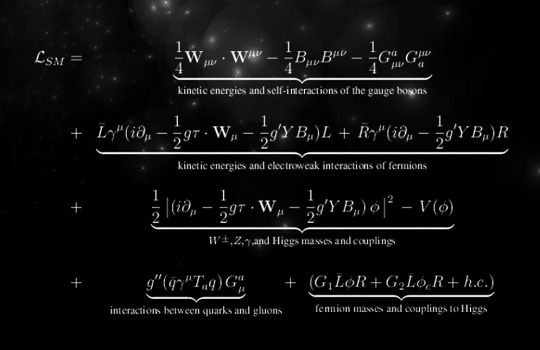







The Most Beautiful Mathematical Equations.
1. General Relativity
The equation above was formulated by Einstein as part of his groundbreaking general theory of relativity in 1915. The theory revolutionized how scientists understood gravity by describing the force as a warping of the fabric of space and time. The right-hand side of this equation describes the energy contents of our universe (including the ‘dark energy’ that propels the current cosmic acceleration). The left-hand side describes the geometry of space-time. The equality reflects the fact that in Einstein’s general relativity, mass and energy determine the geometry, and concomitantly the curvature, which is a manifestation of what we call gravity.
2. Standard Model
This equation describes the collection of fundamental particles currently thought to make up our universe. It has successfully described all elementary particles and forces that we’ve observed in the laboratory to date - except gravity, including recently discovered Higgs boson and phi in the formula. It is fully self-consistent with quantum mechanics and special relativity.
3. The Fundamental Theorem of Calculus
This equation forms the backbone of the mathematical method known as calculus, and links its two main ideas, the concept of the integral and the concept of the derivative. It allows us to determine the net change over an interval based on the rate of change over the entire interval. The seeds of calculus began in ancient times, but much of it was put together in the 17th century by Isaac Newton, who used calculus to describe the motions of the planets around the sun.
4. 1 = 0.999999999….
This simple equation states that the quantity 0.999 followed by an infinite string of nines is equivalent to one, and is made by mathematician Steven Strogatz of Cornell University. Many people don’t believe it could be true. It’s also beautifully balanced. The left side represents the beginning of mathematics; the right side represents the mysteries of infinity.
5. Special Relativity
Einstein makes the list again with his formulas for special relativity, which describes how time and space aren’t absolute concepts, but rather are relative depending on the speed of the observer. It shows how time dilates, or slows down, the faster a person is moving in any direction.
6. Euler’s Equation
This simple formula encapsulates something pure about the nature of spheres. It says that if you cut the surface of a sphere up into faces, edges and vertices, and let F be the number of faces, E the number of edges and V the number of vertices, you will always get V – E + F = 2. So, for example, take a tetrahedron, consisting of four triangles, six edges and four vertices. If you blew hard into a tetrahedron with flexible faces, you could round it off into a sphere, so in that sense, a sphere can be cut into four faces, six edges and four vertices. And we see that V – E + F = 2. Same holds for a pyramid with five faces - four triangular, and one square - eight edges and five vertices, and any other combination of faces, edges and vertices. The combinatorics of the vertices, edges and faces is capturing something very fundamental about the shape of a sphere.
7. Euler–Lagrange Equations and Noether’s Theorem
In this equation, L stands for the Lagrangian, which is a measure of energy in a physical system, such as springs, or levers or fundamental particles. Solving this equation tells you how the system will evolve with time. A spinoff of the Lagrangian equation is called Noether’s theorem. Informally, the theorem is that if your system has a symmetry, then there is a corresponding conservation law. For example, the idea that the fundamental laws of physics are the same today as tomorrow (time symmetry) implies that energy is conserved. The idea that the laws of physics are the same here as they are in outer space implies that momentum is conserved.
8. The Callan-Symanzik Equation
Basic physics tells us that the gravitational force, and the electrical force, between two objects is proportional to the inverse of the distance between them squared. However, tiny quantum fluctuations can slightly alter a force’s dependence on distance, which has dramatic consequences for the strong nuclear force. What the Callan-Symanzik equation does is relate this dramatic and difficult-to-calculate effect, important when the distance is roughly the size of a proton, to more subtle but easier-to-calculate effects that can be measured when the distance is much smaller than a proton.
9. The Minimal Surface Equation
The minimal surface equation somehow encodes the beautiful soap films that form on wire boundaries when you dip them in soapy water. The fact that the equation is ‘nonlinear,’ involving powers and products of derivatives, is the coded mathematical hint for the surprising behavior of soap films.
8K notes
·
View notes
Text
Summarising student-focused outcomes of Physics & Science Education Research
~PER Series, post one: Peer Instruction learning~
The focus of physics education research has been improve how lecturers and teaching staff can improve their teaching, but I was quite fascinated by this and have been reading this and looking at the various academic publications and see what actions us students can take based on the academic research and ‘science of learning’ if you will, to improve how we can understand complex topics, how we can re-ignite the passion for our subjects that drew us to them in the first place that can sometimes be stamped out by monotonous exercise book questions, lecturers that aren’t that interested in lecturing (which I’m lucky enough to so far never have experienced at my institution!), or just from forgetting what it was you loved (I will do a separate post on this specifically!)
This is my first post in a series I plan to focus on different outcomes and studies of Physics Education Research and also Mathematics Education Research, this one is on peer instruction! This applies to many subjects rather than just physics.
One thing that I know has been trialled a lot at my University (and successfully so) has been the concept of Peer-Instruction. It’s no lie when people say that two strengths are better than one, and focused peer instruction can help guide you in understanding topics you don’t understand, realising where you have perhaps come to the right answer but from the wrong methods, and boosting confidence when you’re the one that actually knows the answer and can help explain it to somebody else! One of the key things used in peer-instruction is the concept of first working out your initial answer, then discussing, and then ‘re-voting’. Whilst if you’re trying to do this outside a structured peer-instruction lecture isn’t *exactly* going to work like that, but one thing from a conceptual point of view that I think is important, is this opportunity to ‘revote’ and redecide and review your answer. When you don’t have this and you just come to an answer, then discuss it, you may be more likely to take a defensive view, like “i came to this answer and this is the answer I don’t care what you think” rather than knowing you’re going to re-vote can reframe your thinking in a way that you know you have the opportunity to change you mind, so you’re more likely to have an open-mind in discussions.
Recreating this process in studying with course mates and fellow students can be a good way to improve your learning, and also improving relations with other students. This is different to a casual ‘study group’ which tends to be filled with distraction and more of a social event drinking coffee and talking about irrelevent things (which is also, I note, a good thing to do for your mental and emotional wellbeing!), but adopting a structure of picking a setting some questions to work on, doing them on your own before you meet up, then spend the time discussing each one by one and deciding if you agree, until you come to a fixed conclusion (the object of this exercise is completely and utterly pointless if you’ve looked up an answer sheet before hand), where there is near unanimous agreement throughout the group on the results. Alternatively you can do the questions whilst your in the group setting, on your own, then discuss, then go back again one at a time through the questions together.
This in particularly is a great thing to do in the current online learning thing, because it gives you an excuse to stay in contact with your coursemates and it also makes up for the lack of lectures and tutorials you may be receiving at your university.
It is so critical for the overall learning process to make sure when you see the big complicated really hard problems that ‘no one can solve’ that you just put off as ‘well they gave a really hard exam that year’ or ‘no one else could do that one so it’s fine if I can’t’ to try and tackle those problems [1], and you might be closer than you think to finding the gateway to this by discussing this in groups and using concepts of peer instruction and taking solace in the fact that two heads is almost always better than one.
Ref [1] C.A. Ogilvie (2009) Changes in students’ problem-solving strategies in a course that includes context-rich, multifaceted problems, APS Physics Journal
Ref David E. Pritchard et al. (2009) What Else (Besides the Syllabus) Should Students Learn in Introductory Physics?, APS
#peer instruction#physics education research#studying physics#stem#science#science studyblr#physics studyblr#studyblr#productivity#group study#physics student#physics degree#peer learning#education research
15 notes
·
View notes
Text
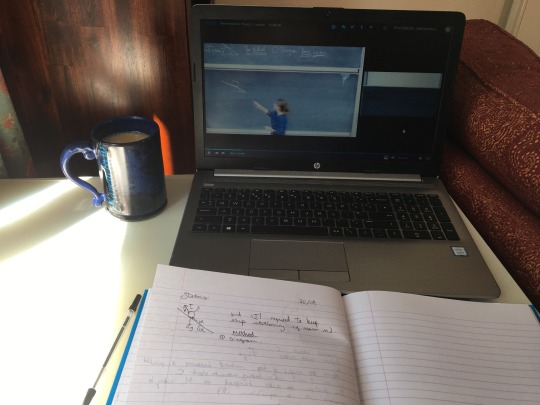
Catching up on lecture recordings I missed during the semester. This one, statics and dynamics!
#studying#edinburgh#physics degree#science studyblr#edinburgh freshers#edinburgh student#maths#physics#scienceblr#studyblr#stem studyblr
63 notes
·
View notes
Text
This is beautiful Izy!
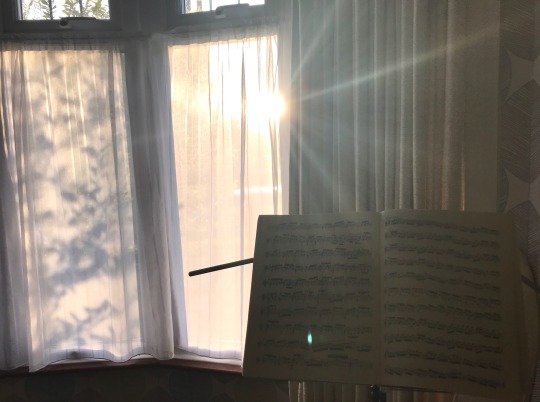
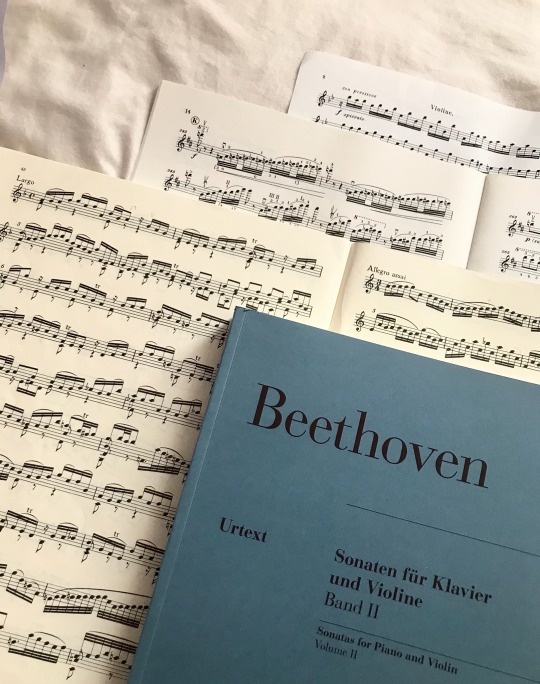
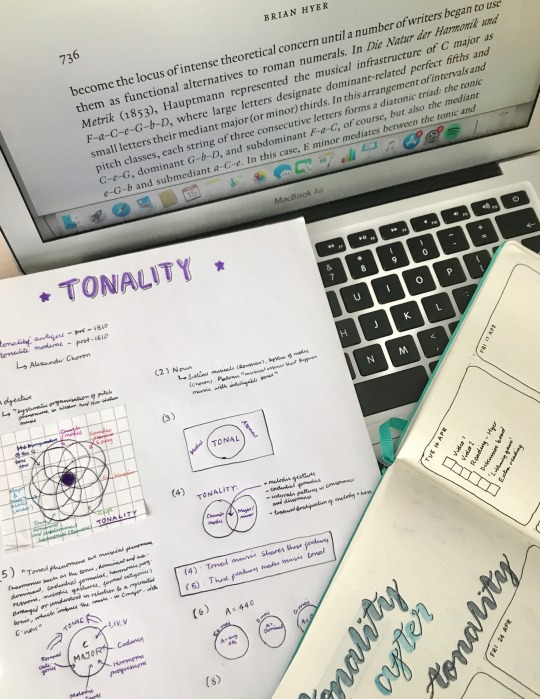
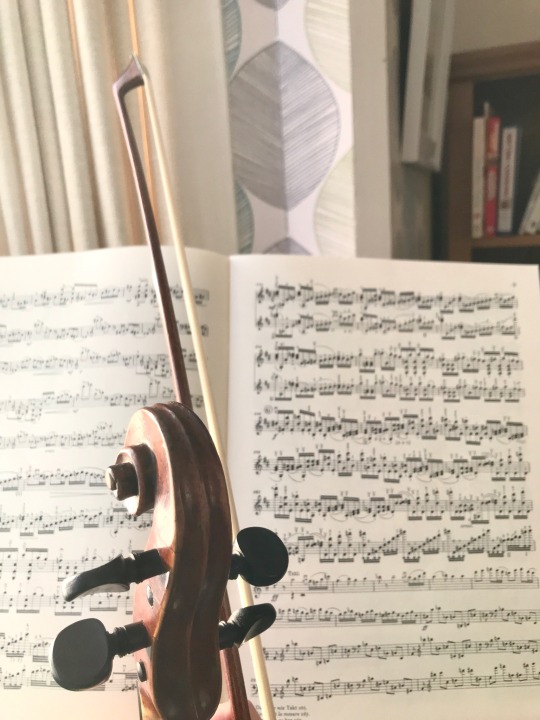
Just living my best ‘isolated music student who’s not allowed to play music with anyone’ life
303 notes
·
View notes